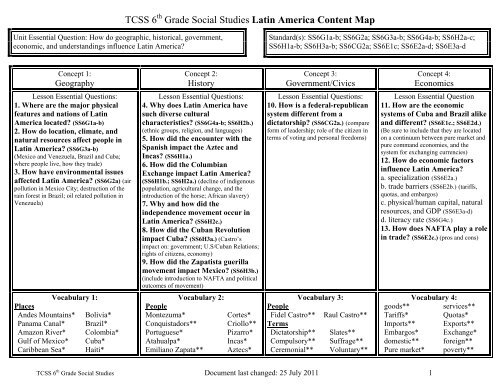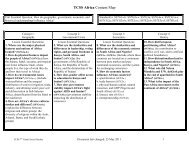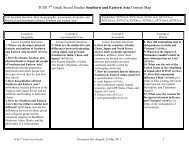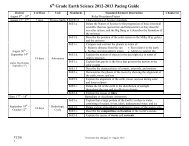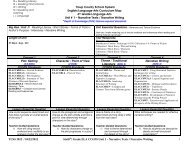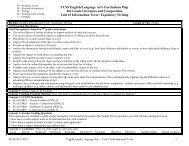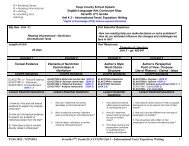Latin America Content Map - Troup 6-12 Teacher Resources
Latin America Content Map - Troup 6-12 Teacher Resources
Latin America Content Map - Troup 6-12 Teacher Resources
You also want an ePaper? Increase the reach of your titles
YUMPU automatically turns print PDFs into web optimized ePapers that Google loves.
Unit Essential Question: How do geographic, historical, government,<br />
economic, and understandings influence <strong>Latin</strong> <strong>America</strong>?<br />
Concept 1:<br />
Geography<br />
Lesson Essential Questions:<br />
1. Where are the major physical<br />
features and nations of <strong>Latin</strong><br />
<strong>America</strong> located? (SS6G1a-b)<br />
2. How do location, climate, and<br />
natural resources affect people in<br />
<strong>Latin</strong> <strong>America</strong>? (SS6G3a-b)<br />
(Mexico and Venezuela, Brazil and Cuba;<br />
where people live, how they trade)<br />
3. How have environmental issues<br />
affected <strong>Latin</strong> <strong>America</strong>? (SS6G2a) (air<br />
pollution in Mexico City; destruction of the<br />
rain forest in Brazil; oil related pollution in<br />
Venezuela)<br />
Vocabulary 1:<br />
Places<br />
Andes Mountains* Bolivia*<br />
Panama Canal* Brazil*<br />
Amazon River* Colombia*<br />
Gulf of Mexico* Cuba*<br />
Caribbean Sea* Haiti*<br />
TCSS 6 th Grade Social Studies <strong>Latin</strong> <strong>America</strong> <strong>Content</strong> <strong>Map</strong><br />
Concept 2:<br />
History<br />
Lesson Essential Questions:<br />
4. Why does <strong>Latin</strong> <strong>America</strong> have<br />
such diverse cultural<br />
characteristics? (SS6G4a-b; SS6H2b.)<br />
(ethnic groups, religion, and languages)<br />
5. How did the encounter with the<br />
Spanish impact the Aztec and<br />
Incas? (SS6H1a.)<br />
6. How did the Columbian<br />
Exchange impact <strong>Latin</strong> <strong>America</strong>?<br />
(SS6H1b.; SS6H2a.) (decline of indigenous<br />
population, agricultural change, and the<br />
introduction of the horse; African slavery)<br />
7. Why and how did the<br />
independence movement occur in<br />
<strong>Latin</strong> <strong>America</strong>? (SS6H2c.)<br />
8. How did the Cuban Revolution<br />
impact Cuba? (SS6H3a.) (Castro’s<br />
impact on: government; U.S/Cuban Relations;<br />
rights of citizens, economy)<br />
9. How did the Zapatista guerilla<br />
movement impact Mexico? (SS6H3b.)<br />
(include introduction to NAFTA and political<br />
outcomes of movement)<br />
Vocabulary 2:<br />
People<br />
Montezuma* Cortes*<br />
Conquistadors** Criollo**<br />
Portuguese* Pizarro*<br />
Atahualpa* Incas*<br />
Emiliano Zapata** Aztecs*<br />
Standard(s): SS6G1a-b; SS6G2a; SS6G3a-b; SS6G4a-b; SS6H2a-c;<br />
SS6H1a-b; SS6H3a-b; SS6CG2a; SS6E1c; SS6E2a-d; SS6E3a-d<br />
Concept 3:<br />
Government/Civics<br />
Lesson Essential Questions:<br />
10. How is a federal-republican<br />
system different from a<br />
dictatorship? (SS6CG2a.) (compare<br />
form of leadership; role of the citizen in<br />
terms of voting and personal freedoms)<br />
Vocabulary 3:<br />
People<br />
Fidel Castro** Raul Castro**<br />
Terms<br />
Dictatorship** Slates**<br />
Compulsory** Suffrage**<br />
Ceremonial** Voluntary**<br />
TCSS 6 th Grade Social Studies Document last changed: 25 July 2011 1<br />
Concept 4:<br />
Economics<br />
Lesson Essential Question<br />
11. How are the economic<br />
systems of Cuba and Brazil alike<br />
and different? (SS6E1c.; SS6E2d.)<br />
(Be sure to include that they are located<br />
on a continuum between pure market and<br />
pure command economies, and the<br />
system for exchanging currencies)<br />
<strong>12</strong>. How do economic factors<br />
influence <strong>Latin</strong> <strong>America</strong>?<br />
a. specialization (SS6E2a.)<br />
b. trade barriers (SS6E2b.) (tariffs,<br />
quotas, and embargos)<br />
c. physical/human capital, natural<br />
resources, and GDP (SS6E3a-d)<br />
d. literacy rate (SS6G4c.)<br />
13. How does NAFTA play a role<br />
in trade? (SS6E2c.) (pros and cons)<br />
Vocabulary 4:<br />
goods** services**<br />
Tariffs* Quotas*<br />
Imports** Exports**<br />
Embargos* Exchange*<br />
domestic** foreign**<br />
Pure market* poverty**
Pacific Ocean* Mexico*<br />
Atacama Desert* Panama*<br />
Venezuela*<br />
Sierra Madre Mountains*<br />
Terms<br />
Air pollution* Acid Rain*<br />
Natural Resource Smog**<br />
Oil pollution Rain forest**<br />
Deforestation Vegetation**<br />
Cattle Ranching Atmosphere**<br />
Overcrowding** Restrictions**<br />
Industrialization**<br />
Vehicle emissions**<br />
Monuments/ruins**<br />
Population distribution<br />
TCSS 6 th Grade Social Studies <strong>Latin</strong> <strong>America</strong> <strong>Content</strong> <strong>Map</strong><br />
Simon Bolivar* Mestizo**<br />
Miguel Hidalgo* Spanish*<br />
Fidel Castro** French**<br />
Zapatistas** Mulatto**<br />
Toussaint L’Ouverture* Spanish*<br />
Cultural diversity<br />
Events<br />
Cuban Missile Crisis<br />
Treaty of Tordesillas**<br />
Columbian Exchange* (Triangular Trade**)<br />
North <strong>America</strong>n Free Trade<br />
Agreement (NAFTA)<br />
Terms<br />
Agricultural dialects**<br />
Revolution Chiapas**<br />
Caste system** Hacienda**<br />
Indigenous people** Diverse**<br />
Roman Empire** Derived**<br />
Ethnic group Dialects**<br />
Roman Catholicism Usurped**<br />
Predominant** Native**<br />
Medieval** Guerilla**<br />
Spaniards** Immunity**<br />
Influenza** Small pox**<br />
Measles** Injustice**<br />
Monotheistic Polytheistic<br />
“Guer” – means war in Spanish**<br />
Romance languages**<br />
Line of Demarcation*<br />
*Vocabulary listed in the GPS Standards<br />
**Vocabulary listed in the <strong>Teacher</strong> Notes, Frameworks, or other state document<br />
Head of state President**<br />
Chief of State**<br />
Voting rights**<br />
Sovereign power**<br />
Personal freedoms*<br />
Candidacy commissions**<br />
Head of government**<br />
Governments<br />
Republic of Cuba*<br />
Federal Republic*<br />
Federal Senate**<br />
United Mexican States*<br />
Chamber of Deputies**<br />
Federative Republic of Brazil*<br />
Bicameral National Congress**<br />
Unicameral National Assembly<br />
of People’s Power**<br />
TCSS 6 th Grade Social Studies Document last changed: 25 July 2011 2<br />
Pure command* Continuum*<br />
Specialization* Investment*<br />
Trade barriers* Currency*<br />
natural resource**<br />
Gross Domestic Product (GDP)*<br />
Human capital (education/training)*<br />
Physical capital/Capital resources<br />
Capital goods (factories, machinery,<br />
and technology)*<br />
North <strong>America</strong>n Free Trade<br />
Agreement (NAFTA)*<br />
Mixed economy*<br />
international trade**<br />
Entrepreneurship*<br />
Standard of Living<br />
Literacy Rate*<br />
socialist state**<br />
state-run entities**<br />
Diversification**<br />
informal economy**<br />
privileged class**<br />
non-transparent**<br />
over-specialization**<br />
opportunity cost**<br />
natural resource**<br />
one-crop economy**<br />
socialist state**<br />
real economic growth rate**<br />
regulatory**<br />
privatized**


